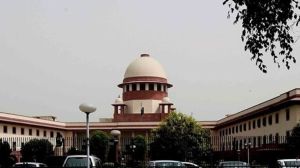Businessman, banker work to break J-K gridlock
WASHINGTON, AUGUST 1: An investment banker from New York and a Connecticut-based furniture tycoon are among the key figures in a Washingto...

WASHINGTON, AUGUST 1: An investment banker from New York and a Connecticut-based furniture tycoon are among the key figures in a Washington-sponsored effort to break the impasse in Kashmir and initiate what could be a lengthy peace process.
Farooq Kathwari, the 54-year-old CEO of the well-known American furniture company Ethan Allen and Mansoor Ejaz, in his late ’30s, form the modern and moderate face of the motley crowd which includes professional “Kashmirists”: Dr Ghulam Nabi Fai of the Kashmiri American Council, Dr. Muhammad Ayub Thakur of the World Kashmir Freedom Movement and Mushtaq Jeelani of the Kashmiri Canadian Council.
Both Kathwari and Ejaz are successful Pakistani-American businessmen with connections to the Clinton White House and the US Congress, and both have in the past advocated “creative” solutions aimed at getting around the stated positions of all parties.
Kathwari is a Kashmiri who came to the United States in the mid-1960s to study. Over the past few years, he has become active in the political and think-tank circles and has promoted the Kashmir Study Group, a think-tank with several South Asia scholars and some lawmakers. Ejaz, a self-made banker, is a political activist and an occasional contributor to The Wall Street Journal and The Los Angeles Times.
Although State Department officials say Washington had no direct role in bringing Hizbul around, sources say it could not have happened without the involvement of intelligence agencies both from India and the US. Seen in this light, the names of offshore luminaries as part of the negotiating process makes sense.
Of all the offshore dramatis personae, Kathwari is acknowledged to have done the maximum spadework in trying to find a way out of the gridlock. Among the ideas that have been bandied around in the past — and attributed to him — is the “Andorra model.”
Andorra is a small principality on the border of Spain and France. A “co-principality” since 803 AD, Andorra was given an “independent” constitution in 1993, which greatly reduced the power of France and Spain over it.
Applied in the Kashmir situation, such a model would result in India and Pakistan declaring LOC as the international border, formally incorporating parts other than the Valley into their countries, and then jointly guaranteeing an autonomy bordering on independence for the Valley alone.
In recent months, Kathwari is said to have met important Indian leaders, including J&K Chief Minister Farooq Abdullah, exploring possibilities along this line. Kathwari had not returned a call seeking comments at the time of writing.
The tentative moves towards a peaceful solution has sent a frisson of excitement among Washington’s South Asia-related think tanks and political community, not all of it pleasing to the Indian ear.
In a Washington Post editorial comment on Monday, Michigan Congressman David Bonior called on the Clinton administration to appoint a Special Envoy for Kashmir, suggesting that he believed Gen Musharraf’s argument that “creating a true democracy in Pakistan hinges on crafting a lasting peace in Kashmir.”
Such a proposition is anathema to the Indians, who, not surprisingly, pointed out that Bonior’s views are influenced by the influential number of Pakistanis in his constituency.
But the overall mood is one of guarded optimism, with hopes that some kind of engagement would begin despite the hedging on conditions from all sides. “Anything to stop the gunfire and start some kind of talks,” one administration official said.



- 01
- 02
- 03
- 04
- 05




























